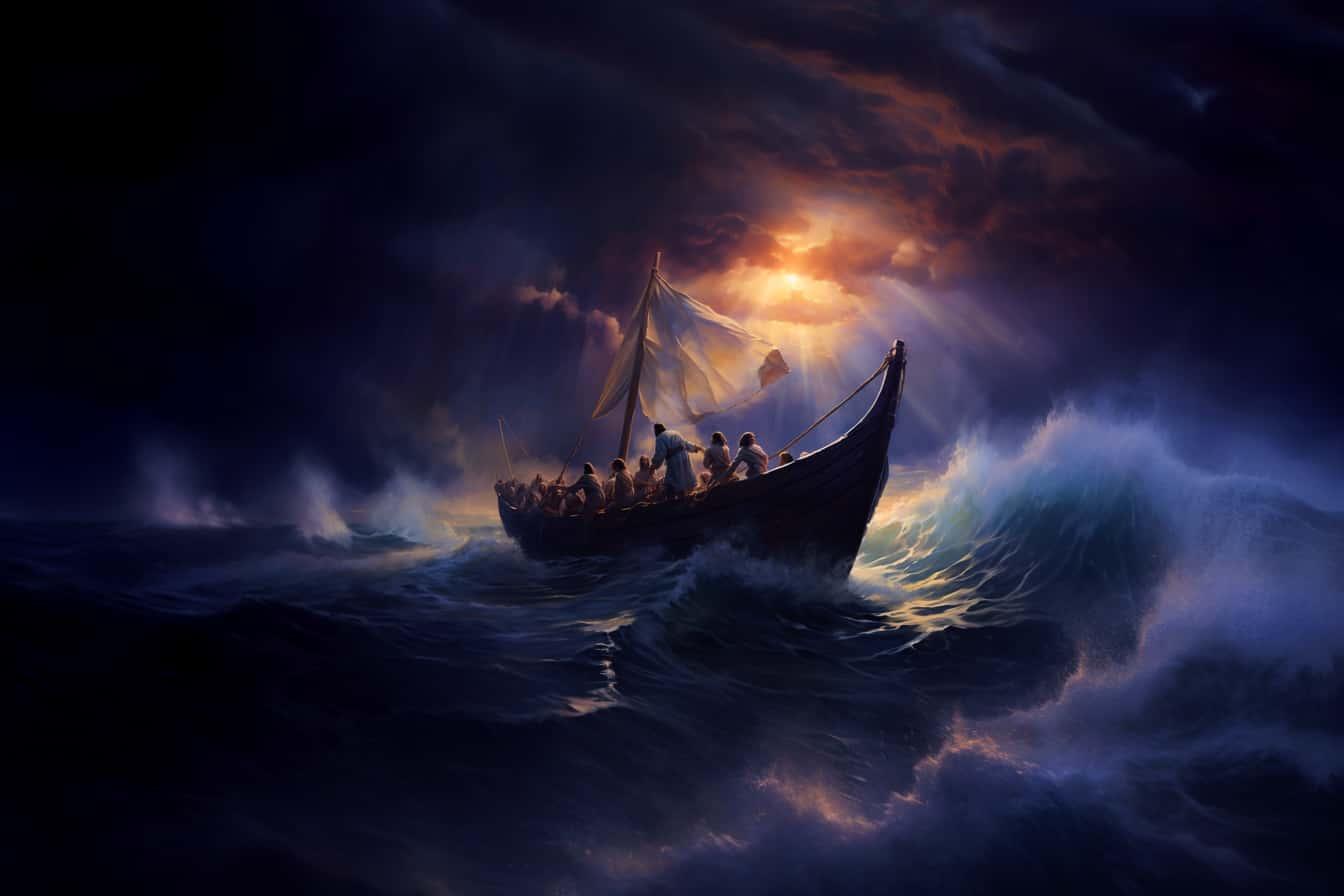Discover Jesus \ Events \Voyage to Kheresa and the Storm
Tag
Voyage to Kheresa and the Storm
Jesus and his group sailed across the Sea of Galilee when a typical storm struck, violently tossing their boat. Jesus, awakened by a frightened Peter, spoke calming words that coincided with the ebbing storm, leading some to believe it was a miracle.

Table of Contents
Summary
In Bethsaida, Jesus was often surrounded by crowds. Jesus, his apostles, and a group of younger evangelists boarded boats and sailed across the Sea of Galilee to the other shore on March 20, 29 CE to rest. While traveling, Jesus slept in the boat's rear.
During their voyage, they encountered a sudden, severe storm, which is common in this body of water due to its characteristics. After the storm tossed the boat and ripped the sail, the apostles had to row a mile to shore. But the winds and rain were so strong that the boat filled with water as waves crashed against it. This panicked Simon Peter, and he woke Jesus to tell him the storm was so bad he had to save them or they would die.
Jesus asked Peter why he was afraid. "Where is your faith?" Peace, be quiet." Peter was distressed and afraid, and these words were directed at him. At that moment, the storm calmed, and the clouds cleared. Peter and the apostles considered this miraculous, but it was just a coincidence. They truly believed spiritual forces influenced all weather phenomena. Peter later said, "Even the winds and the waves obey him."
Jesus Teaches in Bethsaida
In March of 29 CE, Jesus and the apostles were sojourning in Bethsaida, along with all the teaching and preaching groups. Jesus began his parable teaching method at this time, and he attracted large crowds as he taught from the boat. However, on a late afternoon on Sunday, March 20, 29 CE, Jesus told the apostles that he was tired and needed some rest. So, they got in a boat and started rowing to the other side of the lake to seek some solitude for the Master, who retired to the small shelter in the boat to sleep. There were four boats in total: one that held Jesus and the apostles and three other boats that were manned by some of the younger evangelists.
Storm on the Sea of Galilee
On the way across, they faced a sudden and fierce rain/windstorm. This kind of storm is fairly common in the evenings on the Sea of Galilee because of its geographical location and features; the sea itself is nearly 700 feet below sea level, and it is surrounded by high banks. This causes periodic strong rushes of wind from the hills down to the water near sunset when the air begins cooling. This wind phenomenon can happen suddenly, without notice, and can vanish just as quickly.
It was an isolated storm that swooped down on the boats, but it was quite severe; the waves were whipped by the winds, so they began washing over the sides of the boat carrying Jesus and the apostles. The sail was ripped away, and the apostles had to get out the oars and start rowing to the shore, which was about a mile and a half away. The other three boats were trailing behind. All of these men were experienced oarsmen, but this storm was one of the worst they had ever seen.Through it all, the Master lay sleeping in the back of the boat; he was very tired and slept soundly despite the storm's violence. When the boat began taking on water, Peter started to panic and shook Jesus aggressively to wake him up. When he came awake, Peter said: "Master, don’t you know we are in a violent storm? If you do not save us, we will all perish."
Jesus got up, came out into the rain, and after surveying the situation, said to Peter: "Why are all of you so filled with fear? Where is your faith? Peace, be quiet." His words were directed at Simon Peter, whose spirit was distraught and fearful. But just then, the winds calmed, the waves subsided, and all the dark clouds vanished; they could look up and see the stars.
All of this was purely coincidental, as these storms can go away as suddenly as they appear. However, the apostles, especially Peter, always saw this occurrence as a miracle of nature caused by Jesus. They had certain superstitions about nature and that it could only be influenced and controlled by spiritual forces and supernatural personalities. Jesus explained that his words were directed to their troubled and fearful minds, not the storm. But after this experience, they insisted that Jesus had supernatural power over nature. Peter loved to recall how "even the winds and the waves obey him."
By the time they reached their destination, the night was calm and beautiful, and they slept in the boats until morning. When they left the boats just after sunrise, Jesus, the apostles, and the evangelists – about forty all together – gathered together. The hillsides in this area were sloped and gentle, with caverns cut into the rock. Jesus told the group: "Let us go up on this hillside for our breakfast and under some of the shelters rest and talk." About halfway up, they discovered a cemetery that belonged to the little village of Kheresa, which was nearby.
It was here that Jesus encountered Amos, the "Kheresa lunatic."
Suggested Reading from this Essay

Related People
Jesus
Son of God, Son of Man. Creator Son of the Universe.
Related Locations
Sea of Galilee
A lake in Israel where many important events took place.
Contributors
MaryJo Garascia, Mike Robinson, Gary Tonge
